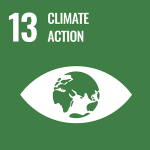
As more countries commit to net zero, climate policies are reshaping global financial markets. Our research explores how one nation’s climate action can ripple across borders—helping policymakers and investors navigate the economic risks of the low-carbon transition.
The challenge
As the effects of climate change have become increasingly severe, more countries have pledged to reach net zero. This means they aim to balance the greenhouse gases they produce with the amount they remove from the atmosphere. To do this, governments are introducing policies that shift energy systems away from fossil fuels and towards clean sources like solar. These changes influence where money flows in the economy, shaping investment decisions across different sectors and countries.
Our research looks at how a net zero policy in one country can affect financial markets elsewhere, even around the world. We want to support policymakers by providing better insights into the economic costs of climate action. At the same time, our work helps investors understand and manage the financial risks linked to climate change and the transition to a low-carbon economy.
Solution
In this study, we focused on country ETFs traded on the US stock market. A country ETF is an investment fund that holds a mix of assets from one specific country, including the largest companies listed on that country’s stock exchange. These funds reflect how that country’s stock market is performing. We chose to study ETFs rather than individual stocks because they offer broader insights, are cheaper to trade, and can be bought and sold more easily.
We analysed nine different country ETFs, along with a global ETF, around the time when the US, UK and China made announcements about their net zero commitments. Our research showed that when one country commits to net zero, it sends a strong signal to global markets that the world is moving towards a cleaner future and that governments are serious about taking climate action.
This matters because financial markets are interconnected. A net zero pledge in one country can influence investor decisions in others. Our findings suggest that markets respond positively to these commitments, as they reduce uncertainty around future climate policies and help investors make more informed choices.
The results highlight that every country has a part to play in the shift to a low-carbon future. Rather than waiting for others to act, countries should take the lead. The global market rewards this leadership, and it can accelerate the world’s progress towards net zero.
Outcome and impact
Our research helps explain how markets react to climate policies, especially the risks and costs involved when countries shift to cleaner economies. This is known as transition risk, and it is important for policymakers who want to understand how their climate decisions might affect financial markets. It is also valuable for investors who need to assess how climate action in one country could influence returns and risks across global markets.
Our research shows that when countries make clear net zero announcements, markets around the world tend to move together. This tells us that investors are paying attention to these signals. When climate policies are made more certain, investors respond positively. It shows that markets understand the challenges of climate change and are already factoring climate risks into how they value investments. Clear commitments to net zero help reduce uncertainty and support investors in managing those risks.
Meet the research team

Dr Mona Mashhadi Rajabi
Postdoctoral Research Fellow
Centre for Climate Risk and Resilience
Explore Dr Mona Mashhadi Rajabi's research→

Professor Martina Linnenluecke
Professor
Centre for Climate Risk and Resilience
Explore Professor Linnenluecke's research
Outputs:
- Information linkages across countries around net zero announcements, ScienceDirect, January 2025
- Global markets are likely to withstand a Trump-led US withdrawal from the Paris Agreement, The Conversation, December 2024
- Decarbonising Down Under: Trump's Ripple Effect, Think: Business Futures - Spotify podcast, April 2025
Collaborate with us
Find out about research collaboration with the UTS Business School.
Research impacts
United Nations Sustainable Development Goals (UN SDGs)

Take urgent action to combat climate change and its impacts


